过去分词作状语的用法
现在分词过去分词做状语的用法

现在分词过去分词做状语的用法以下是 8 条关于现在分词过去分词做状语的用法:1. 嘿,你知道吗,现在分词可以用来表示动作与谓语同时发生呢!就像“Walking in the park, he saw a beautiful flower.(他在公园里走着,看到了一朵美丽的花。
)”,这里的“Walking”是不是很形象地展现了他正在进行的动作呀!2. 哎呀,过去分词做状语也超有意思的呀!比如“She came in, followed by her dog.(她进来了,后面跟着她的狗。
)”,“followed”就很好地说明了她是被狗跟着的状态呢。
3. 瞧呀,现在分词还能表达原因呢!“Not knowing what to do, he asked for help.(不知道该做什么,他寻求帮助。
)”,这不就是因为不知道所以才去求助嘛,多神奇呀!4. 哇塞,过去分词也能表示被动的情况哦!像“Seen from the top of the hill, the city looks so beautiful.(从山顶上看,城市看起来如此美丽。
)”,城市是被看呀,是不是很有感觉?5. 嘿,现在分词做伴随状语也很常见呢!“He sat there, reading a book.(他坐在那里,读着一本书。
)”,读着书这个伴随动作是不是一下子就明白了?6. 哎哟,过去分词做条件状语也不错呢!“Given more time, I could doit better.(如果给我更多时间,我能做得更好。
)”,想想看,如果有那样的条件会怎样?7. 看呀,现在分词做方式状语也是可以的哟!“She smiled, greeting everyone.(她微笑着,和每个人打招呼。
)”,微笑就是她打招呼的方式呀!8. 哇哦,过去分词做让步状语太有意思啦!“Left alone at home, the child didn't feel afraid.(尽管被单独留在家里,孩子并不感到害怕。
过去分词作状语详解

过去分词作状语详解一.过去分词作状语的基本用法:过去分词作状语主要是说明谓语动作发生的背景或条件;表示原因、时间、条件、让步、方式或伴随情况等。
过去分词可置于主句前,也可置于主句后,用逗号与主句隔开。
例如:1. 原因状语Choked by the heavy smoke, he could hardly breathe. 他被浓烟呛了,几乎不能呼吸了。
Caught in a heavy rain, he was all wet. 因为淋了一场大雨,所以他全身湿透了。
Frightened by the noise in the night, the girl didn’t dare to sleep in her room. 受到夜晚响声的惊吓,那姑娘不敢睡在她的房间。
2. 时间状语Left to itself in the room, the baby began to cry.当被孤独地留在房间里时,婴儿哭了起来。
Asked why he did it, the monitor said it was his duty. 当被问及这件事时,班长说这是他的职责。
Approached in the dark, the lights looked lonely and purposeless. 在黑暗中走近时。
那些电灯显得孤单而无意义。
3. 条件状语Seen in this aspect, the matter isn’t as serious as people generally suppose.如果从这个角度看,问题并不像人们一般预料的那样`严重。
Grown in rich soil, these seeds can grow fast. 如果种在肥沃的土壤里,这些种子能长得很快。
Given better attention, the accident could have been avoided. 要是多加注意,那次事故就能避免了。
过去分词作状语的用法归纳

过去分词作状语的用法归纳
1. 哎呀,当过去分词表示被动或完成的时候,就可以作状语啦!就像“He was deeply moved by the story.”这里的“moved”就是被故事深深打动呀。
2. 嘿,要是过去分词用来表达原因,那也是很妙的哟!比如说“Frustrated by the failure, he almost gave up.”这“Frustrated”不就是因为失败而沮丧嘛。
3. 哇塞,当过去分词表示时间,这多神奇呀!像“Seen from the top of the mountain, the view is amazing.”看到没,“Seen”就是从山顶被看到那个时间点呀。
4. 哟呵,过去分词表示条件的时候,是不是很有意思呀!例如“If prepared well, you will do great.”这里的“prepared”就是如果准备好这个条件呀。
5. 哈哈,过去分词还能表示让步呢!像“Though beaten many times, he still doesn't give up.”“beaten”就是尽管被打击很多次啦。
6. 哎呀呀,当表示方式或伴随的时候,过去分词也能上呀!比如“She sat there, lost in thought.”“lost”不就是那种伴随的状态嘛。
7. 嘿呀嘿呀,过去分词作状语的时候,可真是变化多端呢!就像“Surrounded by his friends, he feels happy.”“Surrounded”就是周围被朋友围着呀。
8. 哇哦,过去分词这么有用,大家可得好好掌握呀!
总之,过去分词作状语的用法很多,大家要多多练习,才能运用自如呀!。
过去分词作状语

动词-ing或过去分词作状语, 其逻辑 主语应是主句主语。
2. If ___ the same treatment again, he’s sure to get well. A. giving B. give C. given D. being given
3. _____ in 1636, Harvard is one of the
A. followed C. to be followed
B. following D. being followed
3. The next morning she found the man _A__ in bed, dead.
A. lying C. lay
B. lie D. laying
4. I can hardly imagine Peter _B__ across the Atlantic Ocean in five days.
A. are bought B. bought C. been bought D. buying
( D)14. Don’t use words, expressions, or phrases ________ only to people with specific knowledge. A. being known B. having been known C. to be known D. known
高考链接
(A)1. _______ more attention, the tree
could have grown better.
A. Given B. To give
C. Giving D. Having given.
(D)2. The computer center, ________ last
过去分词作状语
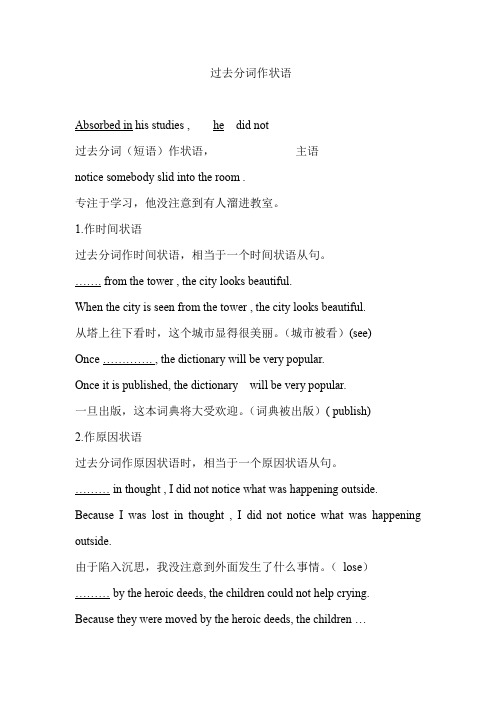
过去分词作状语Absorbed in his studies , he did not过去分词(短语)作状语,主语notice somebody slid into the room .专注于学习,他没注意到有人溜进教室。
1.作时间状语过去分词作时间状语,相当于一个时间状语从句。
……. from the tower , the city looks beautiful.When the city is seen from the tower , the city looks beautiful.从塔上往下看时,这个城市显得很美丽。
(城市被看)(see)Once …………. , the dictionary will be very popular.Once it is published, the dictionary will be very popular.一旦出版,这本词典将大受欢迎。
(词典被出版)( publish)2.作原因状语过去分词作原因状语时,相当于一个原因状语从句。
……… in thought , I did not notice what was happening outside. Because I was lost in thought , I did not notice what was happening outside.由于陷入沉思,我没注意到外面发生了什么事情。
(lose)……… by the heroic deeds, the children could not help crying. Because they were moved by the heroic deeds, the children …孩子们被英雄事迹感动,情不自禁地哭了。
(孩子们被感动)(move) 3.作条件状语过去分词(短语)作条件状语时相当于一个条件状语从句。
………., water changes into steam.If it is heated , water…( heat )加热,水就能变成蒸汽。
过去分词短语作状语课件

注意积累
平时学习中要注意积累过去分词短语作状语的用法,建立 自己的语料库。
在学习过程中,遇到过去分词短语作状语的句子,可以摘 录下来,整理到自己的语料库中。这样不仅可以加深对这 种用法的理解,还可以在以后的写作中加以运用。
常见错误分析
总结词
纠正常见错误,提高语言准确性
详细描述
通过分析常见的错误用法,如"He is followed by his assistant.",可以指出过去分词 短语作状语常见的错误形式,帮助学习者避免类似的错误,提高语言使用的准确性。
05
如何提高过去分词短语作状语的运用能力
多读多写
通过大量的阅读和写作练习,可以提高对过去分词短语作状 语的理解和运用能力。
时间状语
总结词
表示动作发生的时间
详细描述
过去分词短语用作时间状语时,通常放在句首或句尾,用来描述某个动作发生 的时间点或时间段。例如,“Having finished his homework, he went to bed.”(完成作业后,他去睡觉了。)
Hale Waihona Puke 条件状 语总结词表示某个动作发生的条件
详细描述
简单例句分析
总结词
简单明了,易于理解
详细描述
通过简单的例句,如"He came in, followed by his assistant.",可以直观地展示过去分词短语作状语的结构和 用法。这种例句结构简单,容易理解,适合初学者学习。
过去分词作状语的用法

过去分词作状语(The Past Participle used as Adverbial) 一、过去分词作状语的一般用法1. 过去分词作状语,可以表示时间,原因,条件,让步及伴随情况等。
过去分词作状语,可以表示时间,原因,条件,让步及伴随情况等。
过去分词作状语,其逻辑主语必须和句子主语保持一致,并且必须是被动关系。
过去分词作状语,其逻辑主语必须和句子主语保持一致,并且必须是被动关系。
Asked how he broke into the room, he made no answer. (当有人问他怎么闯进屋里来,他一声不吭。
)_________________________________ When heated ,water will be turned into steam. 水加热后会变成蒸汽。
(表示时间)(表示时间) ___________________________________ Deeply moved by the film , we all cried. 由于被电影深深打动,我们都哭了。
(表示原因)___________________________________ Born into a poor family , he had no more than two years of schooling. 出生于贫苦家庭,他只上了两年学。
___________________________________ Given more help, we could have done the work better. 如果给我们的帮助多一些,我们本来能做的更好。
(条件)___________________________________ Though frightened by the big fire , he stood out bravely. 尽管害怕大火,可他还是勇敢地站了起来。
非谓语动词用法解析过去分词作状语

非谓语动词用法解析过去分词作状语非谓语动词用法解析——过去分词作状语过去分词作为一种非谓语动词形式,在英语语法中扮演着重要的角色。
它可以作为状语,修饰动词、形容词以及副词,起到更加精确和丰富的表达作用。
本文将对过去分词作状语的用法进行解析,并举例说明其在不同语境下的运用。
1. 过去分词作时间状语过去分词可以表示一个动作或状态的发生时间,常用于表示被动或完成的行为。
这种用法通常与表示时间的介词短语(如"after"、"before"、"since"、"when"、"while"等)搭配使用。
例1:Having finished her work, she went out for a walk.(完成了工作后,她出去散步了。
)例2:After being repaired, the car was as good as new.(修好后,这辆车好像新的一样。
)2. 过去分词作原因状语过去分词也可以表示一个动作或状态的原因。
它常用于表示被动、先行动作和结果的关系,通常与表示原因的介词短语(如"because of"、"due to"、"thanks to"等)搭配使用。
例1:Because of the heavy rain, the game was canceled.(因为下大雨,比赛被取消了。
)例2:Due to his hard work, he achieved great success.(由于他的努力,他取得了巨大的成功。
)3. 过去分词作方式状语过去分词还可以表示一个动作的方式或方式。
它常与表示方式的介词短语(如"by")或连词(如"as")搭配使用。
例1:He won the race by running faster than others.(他通过比其他人跑得更快赢得了比赛。
过去分词作状语
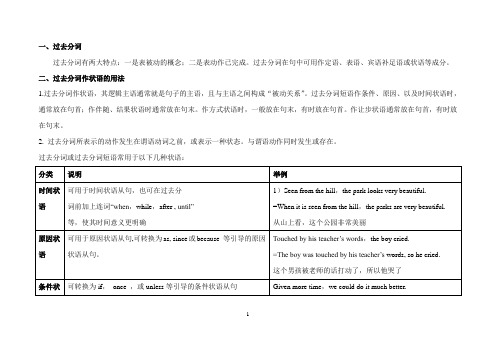
一、过去分词
过去分词有两大特点:一是表被动的概念;二是表动作已完成。
过去分词在句中可用作定语、表语、宾语补足语或状语等成分。
二、过去分词作状语的用法
1.过去分词作状语,其逻辑主语通常就是句子的主语,且与主语之间构成“被动关系”。
过去分词短语作条件、原因、以及时间状语时,通常放在句首;作伴随、结果状语时通常放在句末。
作方式状语时,一般放在句末,有时放在句首。
作让步状语通常放在句首,有时放在句末。
2. 过去分词所表示的动作发生在谓语动词之前,或表示一种状态。
与谓语动作同时发生或存在。
过去分词或过去分词短语常用于以下几种状语:
1
2。
过去分词作状语的用法

—No, it was __A______. A. very boring B. very bored
C. much boring
D. much bored
7. Written in great haste(匆忙), __D______.
A. Jim made a lot of mistakes in the report
D. being considered
13. Your idea surprised me, it is a(n) ___C_____.
A. idea surprised
B. surprised idea
C. surprising idea
D. idea surprising
14. Mrs White showed her students some old maps _C______from the library.
A.to borrow borrowed
B.to be
C.borrowed
D.Borrowing
Homework
1.Do the exercises on page 76( 优化 设计)
2.Do the exercises on page 33 in your textbook.
3.表示条件
动词-ed形式作状语表示条件,相当于一个条件状语从句。
eg: If water is heated,water changes into steam →____H_e_a_t_e_d___, water changes into steam.
加热,水就能变成蒸汽。
If he was given more time,he would be able to do better.
过去分词短语作状语的用法

过去分词短语作状语的用法过去分词短语作状语的用法有很多,以下是60条以上的例子:1. 修饰动词:- 滑冰时,小明跌倒了。
- 他一边读书,一边写作业。
- 她唱完了歌,向观众鞠躬。
2. 修饰形容词:- 他很困疲,连续工作了十个小时。
- 她非常兴奋,因为她被录取了。
3. 修饰副词:- 他跑得很快,追上了那个小偷。
- 他讲得很认真,大家都很受感动。
4. 表示时间:- 昨天我在图书馆看书。
- 他在军队服役了两年。
5. 表示原因:- 天气太热了,我们决定去游泳。
- 因为过去常常下雨,他没有收获到很多庄稼。
6. 表示结果:- 摔跤后,他的腿受伤了。
- 长时间的用眼使她的视力变差了。
7. 表示条件:- 如果得了好成绩,他们就会给她一个奖学金。
- 假如你赢了比赛,我会带你去庆祝。
8. 表示让步:- 尽管难以置信,他们完成了任务。
- 即使生活各方面都很困难,他也从未放弃。
9. 表示方式:- 他小声地说,以免被听到。
- 警察把他粗暴地逮捕起来。
10. 表示伴随:- 我们一起坐在海滩上看着日落。
- 在音乐声中,他们舞蹈了一整晚。
11. 表示目的:- 他去邮局寄信。
- 我们买了一些食物,为了备不时之需。
12. 表示程度:- 晚餐做得很好,大家都吃得很饱。
- 雨下得很大,我们都淋湿了。
13. 表示顺序:- 他按照指示一步一步地进行。
- 他按照说明书安装了电视。
14. 表示比较:- 她比我学得更快。
- 这部电影比预期更好看。
15. 表示条件:- 假如你想要通过考试,你就需要努力学习。
- 如果下雨,我们就会取消野餐计划。
16. 表示结果:- 失去工作,他变得沮丧。
- 她的努力得到了回报。
17. 表示时间:- 经历了许多困难,他终于实现了梦想。
- 她看了一会电视,然后出去散步。
18. 表示原因:- 由于道路交通拥堵,我们迟到了。
- 风大得让树都被吹倒了。
19. 表示让步:- 尽管工作很忙,他还是找时间陪孩子。
- 即使受伤了,他仍然坚持比赛。
什么时候过去分词作状语
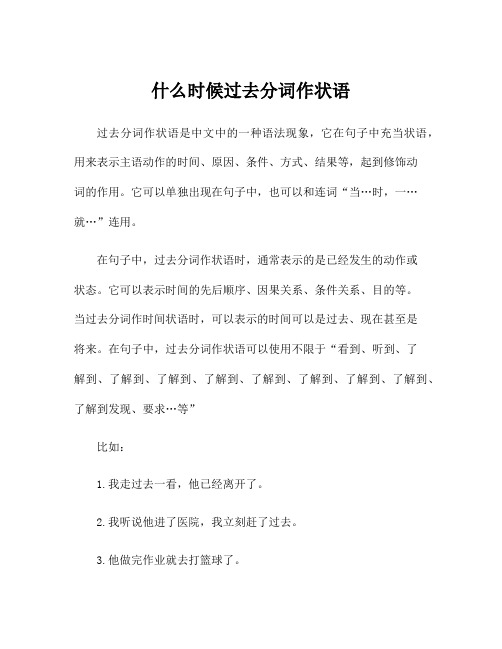
什么时候过去分词作状语
过去分词作状语是中文中的一种语法现象,它在句子中充当状语,用来表示主语动作的时间、原因、条件、方式、结果等,起到修饰动
词的作用。
它可以单独出现在句子中,也可以和连词“当…时,一…就…”连用。
在句子中,过去分词作状语时,通常表示的是已经发生的动作或
状态。
它可以表示时间的先后顺序、因果关系、条件关系、目的等。
当过去分词作时间状语时,可以表示的时间可以是过去、现在甚至是
将来。
在句子中,过去分词作状语可以使用不限于“看到、听到、了
解到、了解到、了解到、了解到、了解到、了解到、了解到、了解到、了解到发现、要求…等”
比如:
1.我走过去一看,他已经离开了。
2.我听说他进了医院,我立刻赶了过去。
3.他做完作业就去打篮球了。
4.太阳落山的时候,他还在工作。
过去分词作状语的句子有时候也可以通过改变主语的位置,将过
去分词置于主语之后,这样可以加强句子的逻辑关系,使句子更通顺。
这种句型通常通过“由于、因为、尽管、虽然、当…时,一…就…”
等连词连接。
比如:
1.由于工作繁忙,他常常加班到很晚。
2.因为生病了,他没能参加聚会。
3.虽然下雨了,但他照样去了操场。
总之,过去分词作状语是中文语法中的一种重要现象,它通过修
饰动词,增强了句子的信息量,使句子更加丰富和生动。
在写作中,
我们可以通过增加过去分词作状语的句式结构,使句子更加多样化,
达到丰富语言表达的目的。
过去分词作状语和短语动词
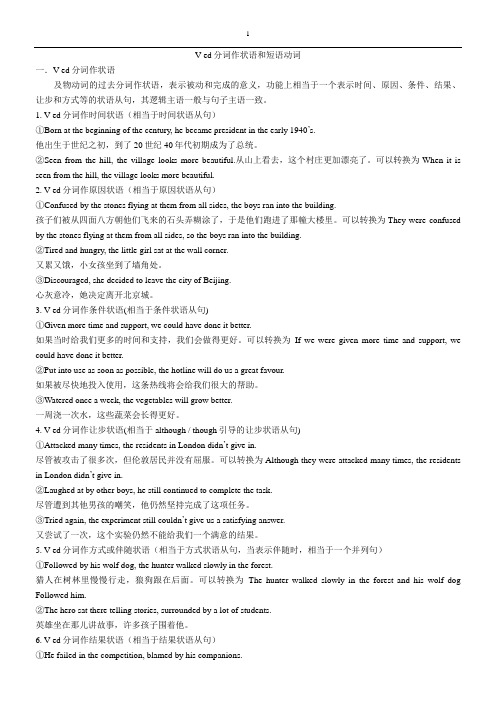
V-ed分词作状语和短语动词一.V-ed分词作状语及物动词的过去分词作状语,表示被动和完成的意义,功能上相当于一个表示时间、原因、条件、结果、让步和方式等的状语从句,其逻辑主语一般与句子主语一致。
1. V-ed分词作时间状语(相当于时间状语从句)①Born at the beginning of the century, he became president in the early 1940’s.他出生于世纪之初,到了20世纪40年代初期成为了总统。
②Seen from the hill, the village looks more beautiful.从山上看去,这个村庄更加漂亮了。
可以转换为When it is seen from the hill, the village looks more beautiful.2. V-ed分词作原因状语(相当于原因状语从句)①Confused by the stones flying at them from all sides, the boys ran into the building.孩子们被从四面八方朝他们飞来的石头弄糊涂了,于是他们跑进了那幢大楼里。
可以转换为They were confused by the stones flying at them from all sides, so the boys ran into the building.②Tired and hungry, the little girl sat at the wall corner.又累又饿,小女孩坐到了墙角处。
③Discouraged, she decided to leave the city of Beijing.心灰意冷,她决定离开北京城。
3. V-ed分词作条件状语(相当于条件状语从句)①Given more time and support, we could have done it better.如果当时给我们更多的时间和支持,我们会做得更好。
过去分词作状语课件

练习题五
总结词
综合运用过去分词作状语的能力
VS
详细描述
这道练习题要求学生综合运用过去分词作 状语的能力,通过写作和翻译练习,让学 生在实际运用中掌握过去分词作状语的用 法,提高语言表达能力。
THANKS
在某些情况下,如果需要强调动作或状态的完成或实现, 可以使用完成时态的过去分词形式,如“Having been done”。
注意与独立主格结构的区别
独立主格结构是指一个名词或代词作 为主语,与谓语动词不存在逻辑上的 主谓关系,而是通过非谓语动词的形 式表达动作或状态。
过去分词作状语时,其动作或状态与 句子主语存在逻辑上的主谓关系,因 此应与主句保持连贯和一致。
例如:“Speaking English, he could communicate with the native speakers.”(他说英语,能够与母语为英语的人交流。)“Having finished his work, he went home.”(完成工作后,他回家了。)
02
过去分词作状语的分类
过去分词作原因状语
1 2
原因状语的定义
用来表示某个动作或情况发生的原因或理由。
过去分词作原因状语的例子
Feeling tired, she decided to take a rest. (因 为感到累了,她决定休息一下。)
3
总结
过去分词作原因状语时,通常放在句首或句尾, 表示某个动作发生的原因或理由。
过去分词作让步状语
01
让步状语的定义
用来表示某个动作或情况发生的转折或让步。
02
过去分词作让步状语的例子
Although treated unfairly, he never complained. (尽管受到了不公
过去分词作定语和状语的用法总结
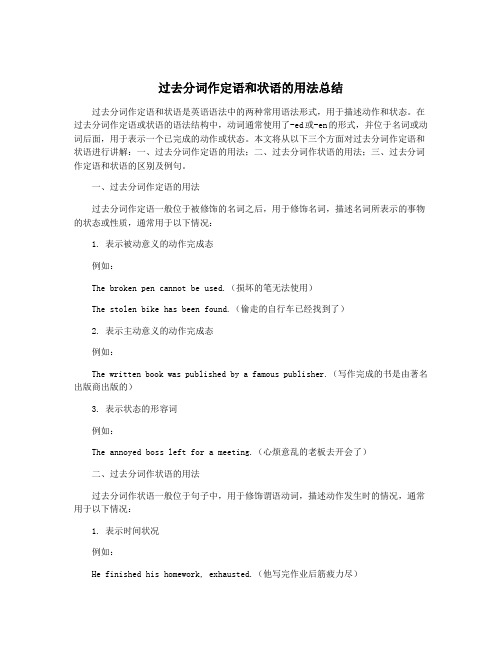
过去分词作定语和状语的用法总结过去分词作定语和状语是英语语法中的两种常用语法形式,用于描述动作和状态。
在过去分词作定语或状语的语法结构中,动词通常使用了-ed或-en的形式,并位于名词或动词后面,用于表示一个已完成的动作或状态。
本文将从以下三个方面对过去分词作定语和状语进行讲解:一、过去分词作定语的用法;二、过去分词作状语的用法;三、过去分词作定语和状语的区别及例句。
一、过去分词作定语的用法过去分词作定语一般位于被修饰的名词之后,用于修饰名词,描述名词所表示的事物的状态或性质,通常用于以下情况:1. 表示被动意义的动作完成态例如:The broken pen cannot be used.(损坏的笔无法使用)The stolen bike has been found.(偷走的自行车已经找到了)2. 表示主动意义的动作完成态例如:The written book was published by a famous publisher.(写作完成的书是由著名出版商出版的)3. 表示状态的形容词例如:The annoyed boss left for a meeting.(心烦意乱的老板去开会了)二、过去分词作状语的用法过去分词作状语一般位于句子中,用于修饰谓语动词,描述动作发生时的情况,通常用于以下情况:1. 表示时间状况例如:He finished his homework, exhausted.(他写完作业后筋疲力尽)She stood there, frozen with fear.(她站在那里,惊恐万分)2. 表示原因或结果例如:Having saved enough money, he bought a new car.(存够了钱,他买了一辆新车)Being late for the meeting, they missed their chance.(因为迟到,他们错过了机会。
)3. 表示条件状况例如:Having finished the task, he went home.(完成任务后,他回家了)三、过去分词作定语和状语的区别及例句过去分词作定语和状语的最大区别在于它们所修饰的词不同。
过去分词作状语的用法归纳
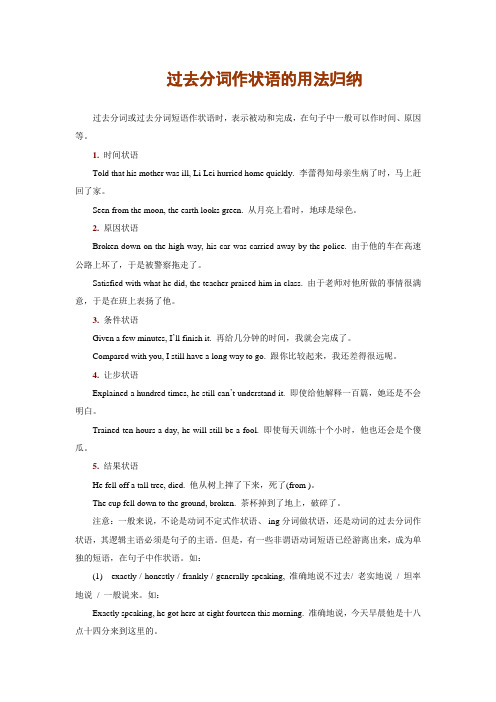
过去分词作状语的用法归纳过去分词或过去分词短语作状语时,表示被动和完成,在句子中一般可以作时间、原因等。
1.时间状语Told that his mother was ill, Li Lei hurried home quickly. 李蕾得知母亲生病了时,马上赶回了家。
Seen from the moon, the earth looks green. 从月亮上看时,地球是绿色。
2.原因状语Broken down on the high way, his car was carried away by the police. 由于他的车在高速公路上坏了,于是被警察拖走了。
Satisfied with what he did, the teacher praised him in class. 由于老师对他所做的事情很满意,于是在班上表扬了他。
3.条件状语Given a few minutes, I’ll finish it. 再给几分钟的时间,我就会完成了。
Compared with you, I still have a long way to go. 跟你比较起来,我还差得很远呢。
4.让步状语Explained a hundred times, he still can’t understand it. 即使给他解释一百篇,她还是不会明白。
Trained ten hours a day, he will still be a fool. 即使每天训练十个小时,他也还会是个傻瓜。
5.结果状语He fell off a tall tree, died. 他从树上摔了下来,死了(from )。
The cup fell down to the ground, broken. 茶杯掉到了地上,破碎了。
注意:一般来说,不论是动词不定式作状语、-ing分词做状语,还是动词的过去分词作状语,其逻辑主语必须是句子的主语。
过去分词作状语

非谓语动词:过去分词过去分词短语作状语过去分词表示完成或被动,作状语时,表示动作发生的背景或者情况,在意义上相当于一个状语从句,其省略的主语逻辑主语是主句的主语,且与主语之间存在被动关系;过去分词作状语可以表示时间、条件、方式、原因、让步等;过去分词的否定式是将not放在其前面;一、过去分词作状语时的具体用法:1)过去分词作时间状语时,相当于一个时间状语从句;有时过去分词前可加连词when或while来强调时间概念.例:1. Asked When he was asked what had happened, his face turned red.当他被问及发生了什么的时候,他的脸红了;2. When heated When it is heated, water changes into steam. 当加热时,水变成水蒸气;3.Told that his mother was illWhen he was told that his mother was illl, Li Lei hurried homequickly. 李蕾得知母亲生病了时,马上赶回了家;4. Seen from the moonWhen it is seen from the moon , the earth looks green. 从月亮上看时,地球是绿色;2)过去分词作原因状语时,相当于一个由as, since, because等词引导的原因状语从句;例:1. Deeply Because they were moved by the movie, the children began to cry.由于被电影深深地感动,孩子们哭了起来;2. Frightened Because she was frightened by the horror movie, the girl didn't dare to sleepalone. 因为被惊悚电影吓坏了,这个女孩不敢单独睡觉;3. Caught in a heavy rain Because he was caught in a..., he was all wet.4. Satisfied with what he did Because the teacher was satisfied with..., the teacherpraised him in class. 由于老师对他所做的事情很满意,于是在班上表扬了他;3)过去分词作条件状语时,通常放在句子的前面,相当于if, unless等引导的条件状语从句; 例:1. Compared with you If we are compared , we still have a long way to go.和你们比起来,我们还有很长的一段路要走;2. Grown If these seeds are grown in rich soil, these seeds can grow fast.如果种在肥沃的土壤里,这些种子能长得很快;3. Given more time If we were given more time, we would be able to do the work muchbetter.4. Given a few minutes If I am given a few minutes, I’ll finish it. 再给几分钟的时间,我就会完成了4)过去分词作让步状语时,相当于一个以though / although引导的让步状语从句,这类分词或分词短语一般放在句子前面;例:1. Left Although he was left at home, John didn't feel afraid at all.虽然John被单独留在房间里, 他一点都不害怕;2. Invited by him Though I was invited by them , I won’t take part in the party.即使被邀请,我也不会参加聚会的;3. Explained a hundred times Although he was explained... , he still can’t understand it. 即使给他解释一百篇,她还是不会明白;4.Trained ten hours a day Though he was trained..., he will still be a fool. 即使每天训练十个小时,他也还会是个傻瓜;5)过去分词作状语表方式或伴随状语时不用状语从句替换,但可以改写成并列句;例:1.She walked out of the house, and she was followed by her little daughter.她走出房子,后面跟着她小女儿;2. She was Dressed in white, and she looked really pretty.穿着白衣服,她看起来确实很美;3.She sat by the window, and she was lost in thought.二、过去分词与现在分词作状语的区别:1)过去分词表完成、被动,与主句的主语之间是被动关系;现在分词表进行、主动,与主句的主语之间是主动关系;试比较:Following the old man, we went upstairs. 跟着那个老人, 我们上了楼;= We followed the old man, and we went upstairs.Followed by the old man, we went upstairs. 我们上了楼, 后面跟着那个老人;= We were followed by the old man, and we went upstairs.Seen from the top, the stadium looks like a bird nest. 从上面看,体育场好像一个鸟巢;Seeing from space, the astronaut can not discover the Great Wall. 从太空看,宇航员看不到长城;2)若分词主语与句中主语不一致,则可以用其他方法来修正;①用with的复合结构等.②改为相应的状语从句来表达;③给分词添加自己的主语,构成独立主格结构④改变语态;例如:完成作业后,孩子们出去踢足球了;Finished their homework, the children went out to play football. ×Their homework finished, the children went out to play football. 独立主格Having finished their homework, the children went out to play football.现在分词完成形式With their homework finished表时间, the children went out to play football. with的复合结构After finishing their homework, the children went out to play football. 介词+动名词例如:当他过马路时,一辆车撞到了他;误:Crossing the road, a car knocked him down.误:Crossed the road, he was knocked down by a car.正:Crossing the road, he was knocked down by a car. 过马路时他被车撞倒了;正:When he was crossing the road, a car knocked him down. 他过马路时车子把他撞倒了; ※注意:的由来解决状语分词的逻辑主语与句子主语不一致的问题,也可在分词前加一个名词或代词,使之成为分词的逻辑主语;由于加在分词前的名词或代词要用主格形式,例:He crossing the road, a car knocked him down.The job finished, we went home. 工作结束后我们就回家了;The weather being fine, we went swimming. 天气很好,我们就去游泳了;He being absent, nothing couldn’t be done. 由于他缺席,什么事也干不成;误:Barking madly,I led the dog out.正:The dog barking madly, I led it out.正:Barking madly,the dog was let out by me.正:Becuase the dog was barkling madly, I led it out.正:With the dog barking madly, I led it out.三、有些过去分词因源于系表结构,已经被形容词化;故作状语时不表被动而表主动,表示人的状态;get lost; be lost in沉溺于;be seated; be compared withbe dressed in; be born; be tired of 厌烦; be tired from be worried about表状态be interested in; be moved by; be disappointed at; be surprised at四、选择现在分词还是过去分词,关键看主句的主语;如分词的动作是主句的主语发出,分词就选用现在分词,反之就用过去分词;Used for a long time, the book looks old. Using the book, I find it useful.Looking at her, he jumped with joy. Looked at by her, he jumped with joy.五、正如第四点所说,不论是动词不定式作状语、-ing分词做状语,还是动词的过去分词作状语,其逻辑主语必须是句子的主语;但是,有一些非谓语动词短语已经游离出来,成为单独的短语,在句子中作状语;如:1 exactly / honestly / frankly / generally speaking, 准确地说不过去/ 老实地说/ 坦率地说/ 一般说来;例:1. Exactly speaking, he got here at eight fourteen this morning. 准确地说,今天早晨他是十八点十四分来到这里的;2. Generally speaking, a snake won’t attack a man unless it is bothered. 一般说来,蛇是不会攻击人的除非你冒犯了它;2 / by... 从/ 根据某东西判断例:1. Judging by his accent, he is from Hunan. 从他的口音来判断,他是湖南人;2. Judging from what he said, he is very honest. 从他所说的话来判断,它是很诚实的;3 providing / provided …假如/ 如果例:1. Providing he follows our advice, we can help him. 要是他按我们的建议去做,我们就能帮助他;2. Provided he is free, he is sure to come. 如果他有空,他肯定会来;4 considering... 考虑到例:1. Considering he was just a little boy, we didn’t punish him. 考虑到他还只是一个小孩,我们就没有惩罚他了;2. Considering it was late, we didn’t discuss the question. 考虑到时间不早了,我们就没有讨论这个问题了;5 ... 想到/ 考虑到例:Thinking of the environment we live in, the waste can’t be thrown away around directly. 考虑到我们所生存的环境,废物不能直接到处乱扔;6 talking of... 谈到/ 说到例:Talking of math, he became excited. 谈到数学,他就兴奋起来了;此外,还有短语:taking...into consideration 把某事考虑进去;calculating roughly, 粗略地计算;supposing... 假定;to tell you the truth 实话告诉你;to be frank 坦白地说;to begin with 首先要做的是;so to speak 可以这么说;taken as a whole 从整体上来看;put frankly, 坦率地说;鉴于等;Ilearn过去分词:作状语练习Multiple Choices Given a lever, anyone can move the earth with it.1.____ into English, the sentence was found to have an entirely different word order.A.TranslatingB. TranslatedC. To translateD. Having translated2.____ the right kind of training, these teenage soccer players may one day grow into international stars.A. GivingB. Having givenC. To giveD. Given3.____ an important role in a new movie, Andy has got a chance to become famous.A. OfferB. OfferingC. OfferedD. To offer4.____ twice, the postman refused to deliver our letters unless we chained our dog.A. Being bittenB. BittenC. Having bittenD. To be bitten5.____ from the top of the tower, the south foot of the mountain is a sea of trees.A. SeenB. SeeingC. Having seenD. To see6.____ time, he’ll make a first-class tennis player.A. Having givenB. To givenC. GivingD. Given7.The island, ____ to the mainland by a bridge, is easy to go to.A. joiningB. to joinC. joinedD. having joined8.____ from this point of view, the question will be of great importance.A. ConsideringB. ConsiderC. To considerD. Considered9.When ____ through the book, I came across an interesting picture.A. lookB. lookingC. lookedD. being looked10.____ that film, I am afraid I cannot say anything about it.A. Not having seenB. Having seenC. Having been seenD. Not seen。
过去分词作状语

12. ___ more attention, the trees could have A grown better.
A. Given C. Giving B. To give D. Having given
A. followed C. to be followed B. following D. being followed
3. The next morning she found the man ___ A in bed, dead.
A. lying C. lay B. lie D. laying
分词的语态 1)通常,现在分词表示主动,过去分词表示被动。 通常, 通常 现在分词表示主动,过去分词表示被动。 例如: He is the man giving you the money. (= who gave you…)他就是给你钱的那个人。 He is the man stopped by the car. (= who was stopped by…)他就是那个被车拦住的 人。 2)不及物动词的过去分词表示动作已经发生, 不及物动词的过去分词表示动作已经发生, 不及物动词的过去分词表示动作已经发生 如gone, fallen, retired, grown-up, escaped, faded, returned等。 例如: a well-read person. 一个读过许多书的人 a much-traveled man 一个去过许多地方的 人 a burnt-out match 烧完了的火
10. European football is played in 80 A countries, ___ it the most popular sport in the world.
- 1、下载文档前请自行甄别文档内容的完整性,平台不提供额外的编辑、内容补充、找答案等附加服务。
- 2、"仅部分预览"的文档,不可在线预览部分如存在完整性等问题,可反馈申请退款(可完整预览的文档不适用该条件!)。
- 3、如文档侵犯您的权益,请联系客服反馈,我们会尽快为您处理(人工客服工作时间:9:00-18:30)。
过去分词作状语(The Past Participle used as Adverbial)一、过去分词作状语的一般用法1. 过去分词作状语,可以表示时间,原因,条件,让步及伴随情况等。
过去分词作状语,其逻辑主语必须和句子主语保持一致,并且必须是被动关系。
Asked how he broke into the room, he made no answer.(当有人问他怎么闯进屋里来,他一声不吭。
)_________________________________When heated,water will be turned into steam.水加热后会变成蒸汽。
(表示时间)___________________________________Deeply moved by the film, we all cried. 由于被电影深深打动,我们都哭了。
(表示原因)___________________________________ Born into a poor family, he had no more than two years of schooling. 出生于贫苦家庭,他只上了两年学。
___________________________________Given more help, we could have done the work better.如果给我们的帮助多一些,我们本来能做的更好。
(条件)___________________________________Though frightened by the big fire, he stood out bravely.尽管害怕大火,可他还是勇敢地站了起来。
(让步)___________________________________The mother came in, followed by her son. 母亲回来了,儿子紧随其后。
(伴随状语)___________________________________He was walking up and down in the room, lost in thought.他陷入沉思,在房间里踱来踱去。
(方式状语)2. 其实今天我们要学的这种语言现象,以前我们是这样解释的:当表示时间、条件、方式、让步等状语从句的主语与句子主语一致或是it,且谓语动词含有be,则从主与be可省。
分析:Once this novel is published, it will be popular. 一旦出版,这本小说将会很畅销。
= Once published, this novel will be popular.When asked about his secret of success, he owed much of his success to his wife and children.= ______________________________________________ , he owed ……While watching Titanic, they couldn’t help crying.=_______________________________________________ , they couldn’t……复习了这一点之后,请你把以上第一点中的划线部分都改变成状语从句。
3. 完成了对划线部分的变换,我们深深地感觉到过去分词与句子主语之间的_____关系。
作状语的过去分词与部分从属连词一起连用,是为了让过去分词某种成分更加突出。
一旦被发现,它就永远不会被忘记。
’t walk. 如果被蛇咬了,应该派人去请医生,不要走动。
可见, 过去分词前面的连词只是起个强调作用。
二、过去分词与V-i n g作状语的区别1. 过去分词表示被动或完成的动作,V-ing表示主动或进行的动作。
Seen from a distance, the mountain looked like an elephant.从远处看,这座山看起来想一头大象。
Seeing the mountain, he always thinks of his childhood.每当看到这座山,他总会想起他的童年。
2.V-ing 的被动式表示正在进行的被动动作,过去分词表示完成的被动动作。
Being helped by Professor Wu, Sara will learn Chinese well.在吴教授的帮助下,萨拉将会学好汉语。
Helped by Professor Wu, Sara has learnt Chinese well.在吴教授的帮助下,萨拉的汉语已学得很好。
3. V-ing 的被动完成式表示先于谓语动词发生的动作,过去分词所表示的动作有时发生在谓语动词前,有时与谓语动词同时发生,有时表示未来的动作或状态。
Having been given the right answer, the teacher asked me to sit down. 准确地回答了老师的问题,老师让我坐下。
Given more time, we will finish the work in time.如果多给的时间,我们就能及时完成这项任务。
三、过去分词的独立主格结构过去分词做状语时,其逻辑主语一般情况下通常是句子的主语。
但是,过去分词的逻辑主语若不是句子的主语时,通常会将逻辑主语保留。
这种结构中过去分词带有自己的逻辑主语。
这种现象叫分词的独立结构。
只用来做状语表示时间、原因、条件、方式或伴随情况。
例如:The table set, they began to have lunch. 桌子摆好后,他们开始吃午饭。
(表时间)All his money gone, he began to look for a job.所有的钱用光了,他就开始找工作。
(表原因)All things considered, the meeting had to be put off.如果全面考虑,会议不得不推迟。
(表条件)He was lying on the grass, his hands crossed under his head.他躺在草地上,头枕着双手。
(表方式)He rushed into the room, his face covered with sweat.他满脸是汗地跑进屋里。
(表伴随)四、重点提示过去分词的独立结构在较口语的问题中还可以用“with/without+名词/代词+过去分词”的结构代替,通常也是表示时间、原因、条件、方式或伴随情况等。
例如:With the experiments carried out ,we started new studies.实验一做完,我们就开始心得研究。
(表时间)With my sister gone, there was nobody to help the old woman.我姐姐一走,就没有人帮助那位老大娘了。
(表原因)The old gentleman was walking, with his arms folded across his chest. 那位老人在散步,双臂交叉放在胸前。
(表方式)Henry left the classroom, without a word spoken.亨利一句话也没有说就离开了教室。
(表伴随)请你翻译一句:他正靠墙站着,手交叉在脑后。
He was standing ______ the wall,_______________________________________ .1. 【2004年全国卷Ⅳ,25】It shames me to say it, but I told a lie when ___________ meeting by my boss.A. QuestioningB. having questionedC. QuestionedD. to be questioned2. 【2001年全国】__________ late in the morning, Bob turned off the alarm.A. To sleepB. SleepingC. SleepD. having slept3. 【2004年辽宁,30】__________ by the beauty of nature, the girl from London decided to spend another two days on the farm.A. AttractingB. AttractedC. To be attractedD. Having attracted4. 【2003年上海,39】Generally speaking, __________ according to the directions, the drug has no side effect.A. when takingB. when takenC. when to takeD. when to be taken5. 【2005年江苏,27】___ in the mountains for a week, the two students were finally saved by the local police.A. Having lostB. LostC. Being lostD. Losing6. ________________________(从顶部看),the new Olympic Stadium in Beijing will look wonderful like a bird’s nest.7.________________________(用鲜亮的颜色印刷),the poster caught everybody’s attention.8._______________________________(当被问到她的愿望时),the little girl smiled.9._______________________________(即使被邀请),I won’t go to her birthday party.10.He walked into the classroom,___________________________(后面跟着几个学生).11. The English Romantic poets are greatly loved in China. (改为同义句)___________ __________in China are the English Romantic poets.12. Once it was published, his work became famous for the absence of rhyme at the end of each line. (改为过去分词做状语)_________ __________ , his work became famous for the absence of rhyme at the end of each line.13. Given more time, me would be able to do the work much better. (改为状语从句)______ ____ _____ _____ more time, we would be able to do thework much better.。
